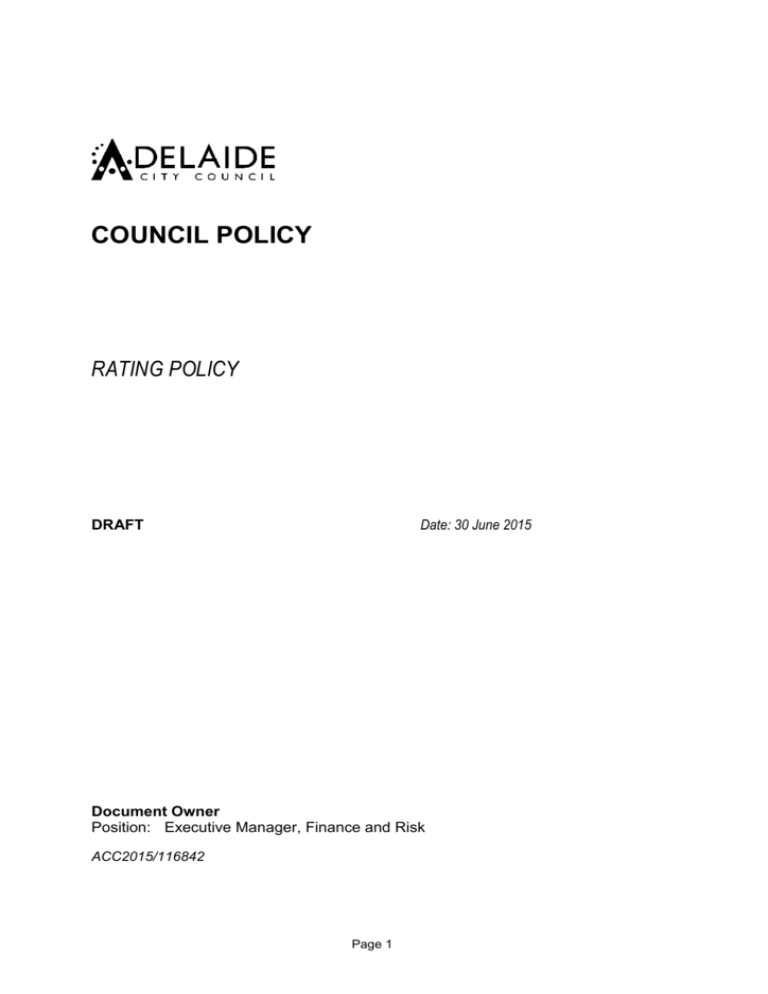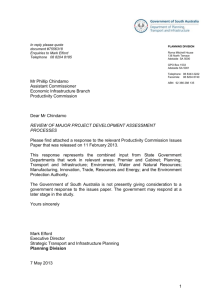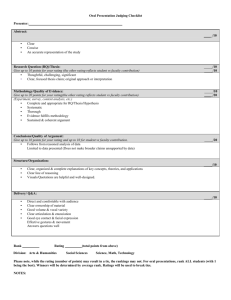Policy Statement 4 – Separate Rates
advertisement

COUNCIL POLICY RATING POLICY Date: 30 June 2015 DRAFT Document Owner Position: Executive Manager, Finance and Risk ACC2015/116842 Page 1 CONTENTS Page Introduction................................................................................................................ 3 Policy Statement 1: Valuation Method ................................................................. 4 Policy Statement 2: Exemptions .......................................................................... 5 Policy Statement 3: Differential General Rates ................................................... 6 Policy Statement 4: Separate Rates ..................................................................... 7 Policy Statement 5: Rating Equity ....................................................................... 9 Policy Statement 6: Payment of Rates .............................................................. 10 Policy Statement 7: Rate Rebates ...................................................................... 11 Policy Statement 8: Postponement of Rates..................................................... 12 Policy Statement 9: Remission of Rates ........................................................... 13 Policy Statement 10: Late Payment of Rates ...................................................... 14 Policy Statement 11: State Government Concessions ...................................... 15 Policy Statement 12: Grievance Procedure......................................................... 16 Page 2 Introduction Council acknowledges that rates constitute a system of taxation for Local Government purposes, as required by the Local Government Act 1999. Rates are determined by reference to the Assessed Annual Value and the Rate in the Dollar. Copies of the Rating Policy are available on Council’s website http://www.adelaidecitycouncil.com , or copies may be obtained from Council’s Customer Centre, Ground Floor, 25 Pirie Street, Adelaide. Page 3 Policy Statement 1 – Valuation Method Council has adopted the Annual Value valuation method for rating purposes. Annual Value is principally based on the annual rental potential of the property. The ‘Annual Value’ has been adopted for the following reasons: For the majority of Council’s ratepayers, it is a suitable valuation measure taking into account their ability to pay according to the income earning capacity of the property. Based on the predominant non-residential land use for the city, Annual Value has been used for many years and is understood by the city's ratepayers. The availability of a significant amount of market annual rental information makes the Annual Value method efficient to administer. The method is considered consistent with the equity, ability to pay, efficiency and simplicity principles of taxation. Page 4 Policy Statement 2 – Exemptions Adelaide City Council’s practice is to identify and value all land in the council area. Once identified each separate piece of land is assessed for rateability. Section 147 of the Local Government Act 1999, specifies those types of properties which shall be exempt from council rates. Adelaide City Council has the highest proportion of ‘rate-exempt’ property of any Council in South Australia. Properties can be identified as exempt from council rates in certain circumstances: Crown Land - public properties used or held by the Crown for a public purpose; University Land - properties occupied by a University; Recreation Grounds - properties satisfying the criteria set out in the Recreation Grounds Rates and Taxes Exemption Act 1981; Council Land - public properties occupied or held by the Council; Another Act - properties specifically exempted from council rates by virtue of another Act (either Commonwealth or State). Council is mindful that wherever properties are exempt from paying council rates, or where a rebate is applied, those rates foregone must be contributed by the rest of the community. The principles of equity dictate that Council remains diligent in only awarding exemptions where they are warranted. It is Council’s practice to adopt valuations for exempt properties. Where exempt properties become rateable part of the way through the financial year, rates are then calculated and recovered. Page 5 Policy Statement 3 – Differential General Rates Council has determined that Differential General Rates will be applied to all rateable properties based on their predominant land use. In formulating the rating structure, Council should consider issues of consistency and comparability across council areas in the imposition of rates on various sectors of the business and wider community. The Local Government Act 1999 allows Council to differentiate rates based on the use of the land. Definitions of the use of the land are prescribed by regulation and the current classes are: 1. Residential 2. Commercial - Shop 3. Commercial – Office 4. Commercial – Other 5. Industrial – Light 6. Industrial – Other Non-Residential 7. Primary Production 8. Vacant Land 9. Other The rating structure has been formulated so that there is effectively one rate in the dollar for property falling within the defined residential land use and another rate in the dollar for property falling within all other (non-residential) land use classes. Local Government utilises a property valuation taxation methodology. Implied in the application of that methodology is that the property valuation should be the basis by which the community’s rates contribution for the Council is apportioned. The property value approximates income or wealth, and therefore ratepayers in high value properties should have a greater ability-to-pay than ratepayers in low value properties. Because the value of the rates payable is linked to the property value, the tax meets the efficiency principle. A ‘Differential General Rate’ tax is simple, understandable and unavoidable and therefore meets the simplicity principle. The equity and ability to pay principles, with the property valuation taxation methodology, imply that an equitable distribution of the rates burden is achieved through the use of a General Rate. The application of a Differential General Rate is generally intended to alter the amount payable by particular land uses, often to approximate the benefit principle; i.e. that certain ratepayers benefit more or less in respect to the level of services consumed. Differential General Rates have been in place since 2003-04. Page 6 Policy Statement 4 – Separate Rates Council has determined that the use and level of the separate rate provision should be limited to the use of a Separate Rate for: recovery of the funding requirements of the Adelaide and Mount Lofty Ranges Natural Resources Management Board; and marketing and managing the Rundle Mall Environs or ‘Levy Area’. Natural Resources Management Levy Separate Rate The Natural Resources Management Act 2004 imposes the duty on Council to make a contribution to the funding requirements of the Adelaide & Mount Lofty Ranges Natural Resources Management Board. The contribution is recovered from ratepayers through a separate rate under Chapter 10 of the Local Government Act 1999. The Adelaide and Mount Lofty Ranges Natural Resources Management (NRM) Board determines the total amount of revenue required from Adelaide City Council ratepayers on an annual basis. The Council acts as a revenue collector for the NRM Board in this regard (under the Natural Resources Management Act 2004). Council does not retain this revenue nor determine how the revenue is spent by the Board. The NRM Separate Rate applies to all rateable land in the Council area and is fixed and calculated to raise the same amount as the Council’s share to be contributed to the NRM Board (taking into account any rebates under Sections 159 to 166 and any remissions under Section 182 of the Local Government Act 1999). The annual rate is calculated based upon the assessed annual value of land. Rundle Mall Differential Separate Rate The Rundle Mall Differential Separate Rate is contributed by non-residential ratepayers within the defined Rundle Mall ‘Levy Area’ and is crucial to the success of the precinct and its increasing appeal to customers, visitors, tourists, shoppers, workers, city residents and students. Customers and visitors demand high standards of activity and presentation in today's competitive market place. Organised activity and programs attract customers and directly benefit all staff & businesses located in the Rundle Mall ‘Levy Area’. The long term delivery of marketing and management for the Rundle Mall ‘Levy Area’ requires sustainable funding and staff resources to attract more visitors and to satisfy their needs. The activities and initiatives funded by the 'Rundle Mall Differential Separate Rate' provide a clean, safe and vibrant environment to enhance the experience of visiting, working, living or learning in the City of Adelaide. The partnership of Adelaide City Council working with property owners, retailers and service sector businesses benefits all stakeholders in the Rundle Mall ‘Levy Area’. Page 7 The map below identifies the Rundle Mall Levy Area. Page 8 Policy Statement 5 – Rating Equity The adopted rating structure has regard to the equity, benefit, ability-to-pay, efficiency and simplicity principles of taxation. Based on a review of the impact on the ratepayers of the City of Adelaide, Council has determined that it should ensure that all relevant land is assessed for rates, and that the provisions of the Local Government Act 1999 should be applied fairly and equitably to all landowners and occupiers. In applying this law Council should act fairly and equitably so that identical land uses will be treated in the same manner. Adelaide City Council is committed to maintaining a transparent rating system; as a result Adelaide City Council ensures that the rating policy is managed to ensure the greatest level of equity for our customers by maintaining a non-punitive rating structure. Adelaide City Council considers equity and ability to pay as the guiding taxation principles when determining the rating structure. It has been concluded that implementation of a minimum rate would represent a regressive taxation structure and be against the guiding taxation principles mentioned above. Some properties are exempt from paying council rates. In certain circumstances rates levied against some properties are rebated according to mandatory provisions of the Local Government Act 1999. Rates foregone through exemption or rebates must be contributed equitably across the remainder of the ratepayer base. Council acts responsibly to only award exemptions and mandatory rebates where they are warranted so as to minimise this impact on the general community. Equity and impact issues are best dealt with when considering all facets of Council’s rating structure, including valuation, rating and collection policies and practices. An assessment for the purposes of rating may be made against any piece of land subject to separate ownership or occupation or any aggregation of contiguous land subject to the same ownership or occupation. In this context land has been defined to include buildings, structures or improvements. For example, this includes automatic teller machines, showcases, signage rights, advertising signs, radio and mobile telecommunication masts. Adelaide City Council's practice is to assess all rateable property in the City and to ensure that up to date market information is used. New evidence is acted upon when received. Page 9 Policy Statement 6 – Payment of Rates Council provides a quarterly billing cycle in accordance with the provisions of the Local Government Act 1999. The quarterly billing cycle has been found to allow for a balance between the cash flow of most ratepayers and the need to ensure sufficient funds for the Council. Council also offers a range of different payment options for the convenience of ratepayers, including the choice to automatically pay rates on time via monthly direct debit instalments. Page 10 Policy Statement 7 – Rate Rebates The Local Government Act 1999 provides for rebates on council rates as follows: Mandatory Rebates Sections 159 to 165 Discretionary Rebates Section 166 Mandatory Rebates Rebates of rates will be granted to ratepayers when the application satisfies the eligibility criteria for Mandatory Rebates under Sections 159 to Section 165 of the Local Government Act 1999. Specific provisions are made for land used for health services, community services, religious purposes, the Royal Zoological Society and educational purposes. Where applications do not meet the eligibility criteria for a mandatory rebate, an applicant may apply for a rebate of rates under the discretionary rebate criteria. Discretionary Rebates Discretionary rebates are reviewed on a case-by-case basis in accordance with Council’s Discretionary Rate Rebate Policy. Applications must be made in writing, explaining the need for financial assistance. Sufficient information and supporting documentary evidence must be included. All assessment criteria will be applied fairly and equitably to each application on merit. Page 11 Policy Statement 8 – Postponement of Rates Under certain circumstances, ratepayers will be able to postpone payment of their rates. The postponed amount is subject to a monthly interest charge, with the accrued debt being payable on the disposal or sale of the property. The debt may be paid at an earlier time at the ratepayer’s discretion. Seniors Postponements The Local Government Act 1999 provides the option for eligible Seniors Card holders to apply to postpone part of their Council rates. This is in accordance with Section 182A of the Local Government Act 1999. The Seniors Postponement does not affect eligibility for existing entitlements to Pensioner Concessions or Remissions. Detailed eligibility criteria and an application form are available in Council’s Rating Operating Guidelines. Discretionary Postponements Where an application from a ratepayer demonstrates that payment of rates in accordance with this policy would cause hardship, the Council may postpone payment of rates in whole or in part for such period as Council thinks fit. Council has determined that discretionary postponements shall be applied, as required, in cases of proven hardship, or other circumstances in accordance with Section 182 of the Local Government Act 1999. Council has discretion to revoke the postponement, in which case Council must give the ratepayer at least thirty days written notice of the revocation before taking action to recover rates affected by the postponement. Page 12 Policy Statement 9 – Remission of Rates Council has determined that under the following circumstances, certain ratepayers may be entitled to a partial remission of rates funded by the Council. Pensioner Remission A pensioner ratepayer who owns their own home and has satisfied the eligibility criteria to receive a State Government funded Cost of Living Concession, will also receive (on application) a Council funded Pensioner Remission of rates to the value of $100 for the financial year. Self-Funded Retiree Remission A self-funded retiree ratepayer who owns their own home and has satisfied the eligibility criteria to receive a State Government funded Cost of Living Concession, will also receive (on application) a Council funded Self-Funded Retiree Remission of rates to the value of $50 for the financial year. Hardship Remission A ratepayer, who satisfies the eligibility criteria and currently receives a State Government funded hardship benefit, will also receive (on application) a Council Hardship Remission to the value of $100 for the financial year. Financial Hardship In addition to the remission for pensioners, self-funded retirees and financial hardship beneficiaries, applications for remission of rates based on financial hardship will be considered on merit. An applicant who satisfies the eligibility criteria for hardship does not automatically become eligible for a remission of rates. If appropriate, and where possible, consideration will be given to flexible payment options. Applications for remission of rates based on financial hardship should be submitted, in writing, and will be considered on a case-by-case basis. Ratepayers who are experiencing financial difficulties and are unable to make their rate payment by the last date are encouraged to contact Council’s rates staff at the earliest opportunity to discuss a revised instalment payment scheme. All discussions relating to payment difficulties will be treated in the strictest confidence. Page 13 Policy Statement 10 – Late Payment of Rates Based on a review of the impact on the ratepayers of the City of Adelaide, late payment fines and penalties will be applied to any outstanding rates not paid by the last day to pay. Late payment fines and interest are calculated in accordance with Section 181(8) & (17) of the Local Government Act 1999. Council has limited options to ensure all ratepayers pay promptly, and so enforcement of late payment penalties is considered reasonable. Council has consistently imposed fines and interest in accordance with the Local Government Act 1999 in order to be fair and equitable to the vast majority of ratepayers who pay on time. Council may take legal action to recover any overdue amounts, fines and interest. If an amount payable by way of rates in respect of land has been in arrears for three years or more, Council may sell the land in accordance with Section 184 of the Local Government Act 1999. A formal resolution of the Council is required before any sale of land (to recover rates) is commenced. Page 14 Policy Statement 11 – State Government Concessions The State Government has announced its intention to replace existing Council rate concessions from 1 July 2015 with a Cost of Living Concession which will be paid directly to ratepayers. As such, State Government funded pensioner and self-funded retiree concessions will no longer be available to directly reduce Council rate notices. Eligible ratepayers have the option of using these concession payments to offset Council rates. More information is available from the following website: http://www.sa.gov.au/concessions. Page 15 Policy Statement 12 – Grievance Procedure Council is committed to accountable and transparent decision making processes, and providing access to a fair and objective procedure for the internal review of decisions. If a ratepayer has any queries or concerns about the Rating Policy or their Valuation and Rate Notice they should, in the first instance, contact the Council’s rates staff. All attempts will be made to resolve concerns quickly and efficiently without the need for a formal grievance application to be lodged. If, however, the ratepayer feels that their concerns are not being adequately dealt with, Council’s Grievance Policy and Procedure allows them to seek further clarification or redress. Council’s Grievance Policy and Procedure has been developed and adopted in accordance with Section 270 of the Local Government Act 1999. Copies of the Grievance Policy and Procedure are available for public inspection on Adelaide City Council’s website (www.adelaidecitycouncil.com) and at the Customer Centre, 25 Pirie Street Adelaide without charge. The State Ombudsman If the ratepayer feels that their application has not been dealt with satisfactorily by Council, they can take their concerns to the State Ombudsman. The Ombudsman has comprehensive powers to investigate the actions of Local Government. Concerns can be taken to the Ombudsman at any time during the grievance application review process. If a grievance application is taken to the Ombudsman while the Council review is also in progress, Council’s review may be suspended until the outcome of the Ombudsman’s review has been considered. The Ombudsman may decline to investigate matters where the applicant has been aware of them for more than twelve months. Finally, it remains the right of ratepayers to commence legal action against Council, in accordance with the Limitation of Actions Act 1936. Page 16 Disclaimer A rate cannot be challenged on the basis of non-compliance with Council’s Rating Policy Statements and must be paid in accordance with the required payment provisions. Page 17








